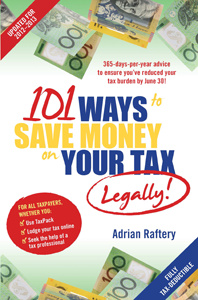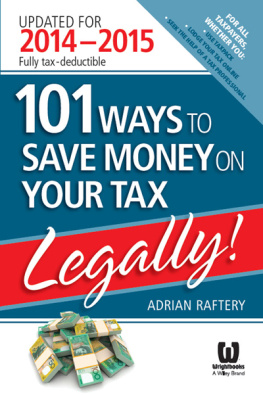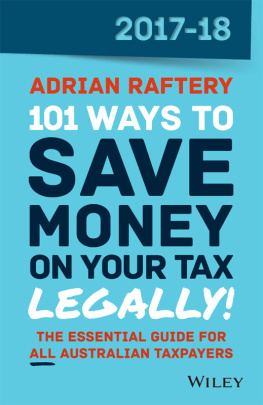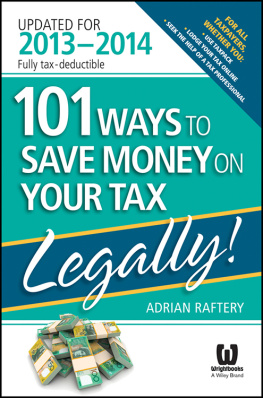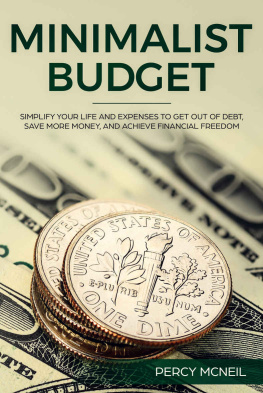First published in 2013 John Wiley & Sons Australia Ltd
42 McDougall St, Milton Qld 4064
Office also in Melbourne
The moral rights of the author have been asserted
Fast Money: Save Money on Your Tax Adrian Raftery 2013
Excerpts taken from 101 Ways to Save Money on Your TaxLegally! 201213 edition, first published 2012 by Wrightbooks, an imprint of John Wiley & Sons Australia, Ltd
National Library of Australia Cataloguing-in-Publication data:
Author:Raftery, Adrian, 1971
Title:Save Money on Your Tax [electronic resource] / Adrian Raftery.
ISBN: 9781118612934 (ebook)
9781118612927 (ebook: Kindle)
Series: Fast money.
Subjects:Tax deductionsAustralia.
TaxationAustralia.
Finance, PersonalAustralia.
Dewey number:336.2060994
All rights reserved. Except as permitted under the A ustralian Copyright Act 1968 (for example, a fair dealing for the purposes of study, research, criticism or review), no part of this book may be reproduced, stored in a retrieval system, communicated or transmitted in any form or by any means without prior written permission. All inquiries should be made to the publisher at the address above.
Disclaimer: The material in this publication is of the nature of general comment only, and does not represent professional advice. It is not intended to provide specific guidance for particular circumstances and it should not be relied on as the basis for any decision to take action or not take action on any matter which it covers. Readers should obtain professional advice where appropriate, before making any such decision. To the maximum extent permitted by law, the author and publisher disclaim all responsibility and liability to any person, arising directly or indirectly from any person taking or not taking action based on the information in this publication.
21 tips to save money on your tax
This book is designed to be of benefit to 99.9 per cent of taxpayers. If you have a family, work as an employee or invest in your education, there will be something in here for you.
Part I: You and your family
The hardest thing in the world to understand is the income tax.
Albert Einstein (18791955)
From marriage and children right through to divorce, retirement and ultimately death, all families encounter many life-changing events. And in nearly all of these events, there are tax consequences along the way.
The Australian tax system offers a range of tax benefits including credits, refunds, offsets and bonuses to support families. Some people feel ambivalent about putting their hand out for government entitlements. But dont be shy in claiming your fair share. After all, the government doesnt get shy when it comes to taxing you!
Tax fact
Tax evasion and tax avoidance are illegal ways of reducing your tax payable. Tax planning and tax minimisation are legal ways of reducing your tax payable.
Part I looks at the tax concessions available to families, the special considerations you need to look out for, as well as some simple strategies to save tax within your family.
Tip
You need a tax file number (TFN) to be eligible for any of these tax concessions, as do your spouse and your children who have income, superannuation or investments.
Tip
If you place money in a term deposit, consider having it mature after 30 June so that any income is not assessable until the following financial year.
1 Marriage
Accountants are frequently asked two questions by couples just about to get married: Are there are any tax implications once we tie the knot? and Do we need to start doing joint tax returns?
Your wedding day is a special day. So Im perplexed as to why on earth the bride and groom are thinking about the ATO during such an exciting time in their lives!
You dont need to worry about tax in the lead-up to your impending nuptials. Unless you are involved in a business together, you dont have to lodge a combined tax return. Any share of joint investments, such as interest, dividends and rental properties, is still recorded separately in your respective tax returns.
Tip
You dont have to lodge a combined tax return if youre married. Any joint income is recorded separately in your respective tax returns.
You do need to show on your return that you now have a spouse, and disclose his or her taxable income each year. Your combined income is taken into account if you dont have private health insurance (an extra 1 per cent Medicare levy is charged if you earn over $168 000 combined increasing to 1.5 per cent for couples earning more than $260 000) as well as when calculating Family Assistance Office benefits such as the baby bonus, child care rebates and family tax benefits.
If you elect to change your name, you can notify the tax office simply by noting it on the front cover of your next return. You dont need to provide any certified documents.
According to the ATO, the definition of spouse has been extended so that both de facto relationships and registered relationships are now recognised. Your spouse is another person (whether of the same sex or opposite sex) who:
is in a relationship with you and is registered under a prescribed state or territory law
although not legally married to you, lives with you on a genuine domestic basis in a relationship as a couple.
Tax fact
Since 1 July 2009, people living in same-sex relationships have been treated in the same way as heterosexual couples for tax purposes. The ATO has outlined some of the tax concessions now open to same-sex couples, including:
Medicare levy reduction or exemption
Medicare levy surcharge
net medical expenses tax offset
dependant tax offset
pensioner tax offset
SchoolKids Bonus
spouse super contributions tax offset
main residence exemption for capital gains tax.
It is not unusual to find a couple where each owns a main residence that was acquired before they met. However, spouses are only entitled to one main residence exemption for capital gains tax (CGT) purposes between them. If both members of a couple own a main residence they must either:
select one residence for the exemption
apportion the CGT exemption between the two residences.
Provided the homes meet the requirements for the main residence exemption, they will both be wholly exempt from CGT for the period prior to the couple being treated as spouses. However, from the time the couple became spouses, only one exemption is available, although this may be divided between the two dwellings.
Example
Mary bought a house in 1992. She lived in it right up to the day she married Matthew in 2006 and moved into his house, which he purchased in 2000. As they elected to treat Matthews house as their main residence, Mary will be subject to CGT on her house from 2006. She will not be liable for CGT on any capital growth in the 14 years prior to becoming Matthews spouse.
2 Income splitting
Income splitting is a legitimate tax-planning tool and one of the easiest strategies to implement. There are a few simple strategies for you to follow and they all mainly revolve around the marginal tax rates for yourself and your spouse, both now and in the future. The tax rates for individuals, not including the Medicare and flood levies, are shown in table 1.1.
The goal is to try to level the income of couples so that they are paying tax at the same marginal rate. While income from personal exertion (such as your salary) cannot be transferred to the other partner, there is scope to have passive income from investments transferred if the assets are held in the lower-earning spouses name.

